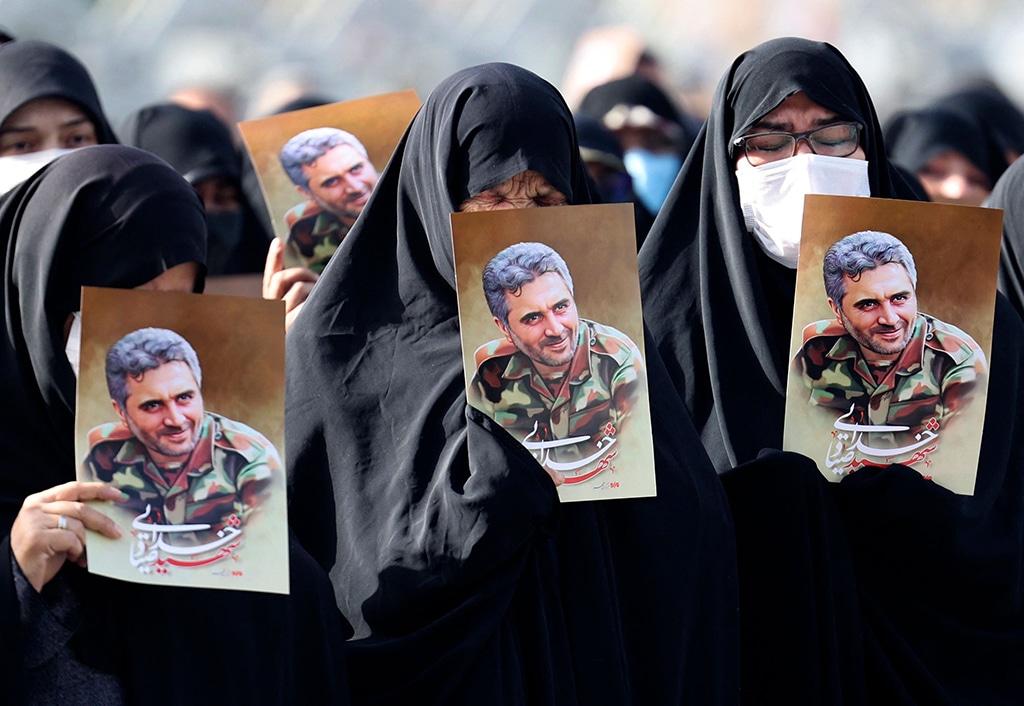TEHRAN: Iran said Thursday an engineer was killed in an "accident" at a defense research unit in an area near Tehran that hosts a military complex previously scrutinized by the UN nuclear watchdog. The Wednesday evening incident came days after a colonel in the Revolutionary Guards, the ideological arm of Iran's military, was shot dead near his home in east Tehran.
Iran's arch foe the Zionist entity told the United States it was behind the operation, The New York Times reported. Iranian officials had blamed agents of the US and its allies for the "assassination", the most high profile inside Iran since 2020. Iran's defense ministry said it was investigating the "accident" at the research unit in the Parchin area, southeast of the capital Tehran.
"On Wednesday evening, in an accident that took place in one of the research units of the defense ministry in the Parchin area, engineer Ehsan Ghad Beigi was martyred and one of his colleagues injured," the ministry said in a short statement. "Investigations into the cause of this accident are underway."
State media had earlier reported that one person was killed and another injured in an "industrial accident" in Parchin. The Parchin complex is alleged to have hosted past testing of conventional explosives that could be used to detonate a nuclear warhead, something Iran has repeatedly denied. The site came under renewed scrutiny by the International Atomic Energy Agency in 2015 when Tehran reached a landmark deal with major powers under which it agreed to curb its nuclear activities under UN supervision in return for the lifting of international sanctions.
Iran had previously denied the IAEA access to Parchin, insisting it was a military site unrelated to any nuclear activities, but the agency's then chief, the late Yukiya Amano, paid a visit. In June 2020, a gas tank explosion in a "public area" near the complex shook the capital, 30 km away, but caused no casualties, the defense ministry said at the time.
Iran's nuclear program has been the target of a campaign of sabotage, cyberattacks and assassinations of key scientists that it has blamed on the Zionist entity. Zionist leaders have repeatedly refused to rule out military action to prevent Iran developing an atomic bomb. Iran has consistently denied any ambition to develop a nuclear weapon, insisting its activities are entirely peaceful.
On Sunday, assailants on motorcycles killed Guards colonel Sayyad Khodai with five bullets as he sat in his car outside his home. The Guards described Khodai as a "defender of the sanctuary", a term used for anyone who works on behalf of the Islamic republic in Syria or Iraq. Iran maintains significant political influence in both countries and has backed President Bashar Al-Assad's government in Syria's grinding civil war.
President Ebrahim Raisi warned on Monday that Iran will avenge Khodai's killing. Iran blamed "elements linked to the global arrogance" - the Islamic republic's term for the United States and its allies, including the Zionist entity. In a letter to the UN Secretary General Antonio Guterres, Iran's UN ambassador Takht Ravanchi said the international community must condemn the killing. "In line with its responsibilities to genuinely fight terrorism and in a non-discriminatory manner, the UN is expected to condemn this atrocious act," Ravanchi said. Without naming anyone specific, he said the attack was carried out "by certain regimes to advance their illegitimate foreign policy goals in the region."
On Wednesday, the New York Times reported that the Zionist entity had told the US it was responsible for the killing. The paper reported that "according to an intelligence official briefed on the communications, (the Zionist entity) has informed American officials that it was behind the killing". The source, who spoke on condition of anonymity, said the Zionist entity told US officials the killing was meant as a warning to Iran to halt the operations of a covert group within the Quds Force - the foreign operations arm of the Revolutionary Guards.
It was the most high-profile killing inside Iran since the Nov 2020 murder of top nuclear scientist Mohsen Fakhrizadeh. It came as talks between Iran and major powers on restoring the troubled 2015 nuclear deal remain stalled. One of the main sticking points is Tehran's demand for the Guards to be removed from a US terrorism blacklist - a request rejected by Washington. - AFP





